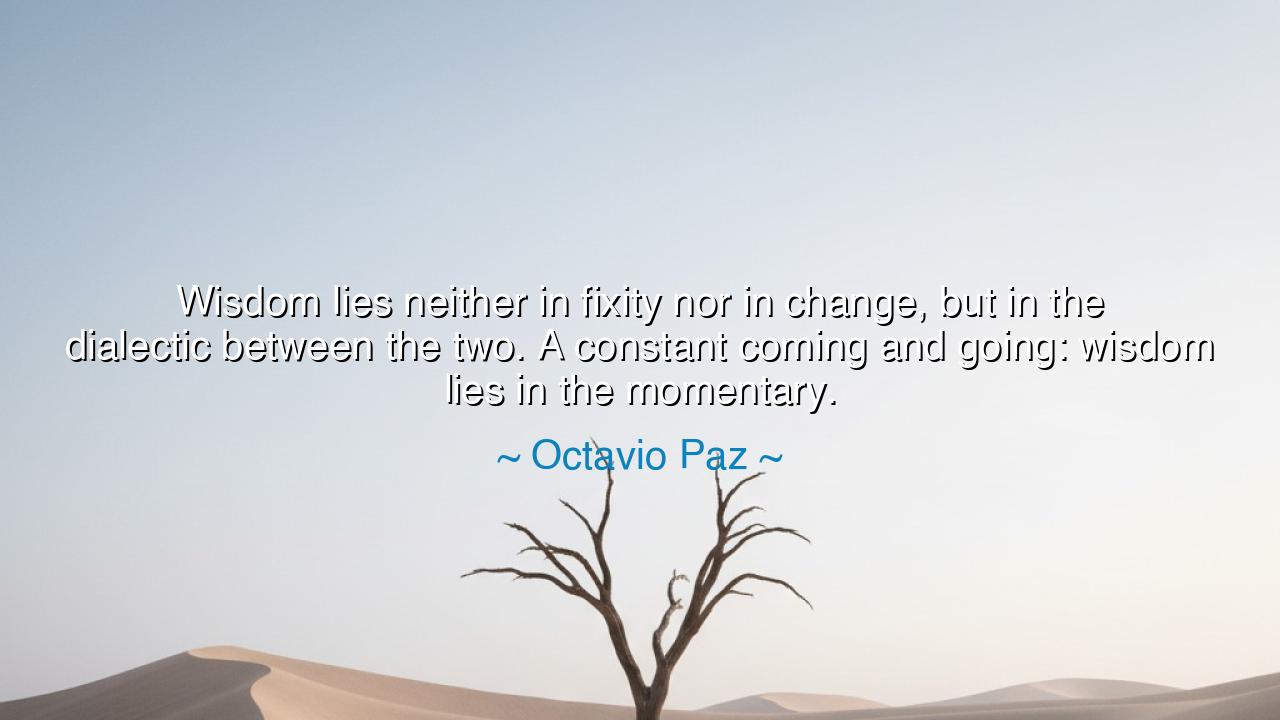
Wisdom lies neither in fixity nor in change, but in the
Wisdom lies neither in fixity nor in change, but in the dialectic between the two. A constant coming and going: wisdom lies in the momentary.






Hearken, O children of the ages, to the luminous words of Octavio Paz, who reveals the subtle and profound nature of wisdom. He teaches that true understanding lies neither in rigid fixity nor in endless change, but in the sacred dialogue between the two. Wisdom is born in the tension of opposites, in the dialectic that allows stillness and motion, permanence and flux, to converse within the soul.
Paz reminds us that life itself is a river of ebb and flow, where moments arise and vanish like ripples upon water. To cling to permanence blinds the mind to growth; to pursue only change scatters the spirit. Wisdom lies in the momentary, in the transient harmony of opposing forces, in the keen perception that discerns the eternal in the fleeting and the stable within the transient.
Consider the life of Leonardo da Vinci, who exemplified the dialectic between fixity and change. He observed the constancy of natural laws in anatomy, physics, and geometry, yet embraced the flux of life’s phenomena, from shifting light to flowing water. His genius emerged in the momentary, where observation and insight converged, revealing truths that transcend the mere accumulation of knowledge.
Even in simpler acts, this principle endures. The gardener who tends both to the enduring roots and the ephemeral blooms, the philosopher who contemplates eternal truths while engaging with present events, and the musician who balances melody and silence—all experience the coming and going in which wisdom resides. In this dynamic interplay, understanding is neither fixed nor fleeting, but alive and luminous.
O children of the future, carry this teaching in your hearts: embrace both fixity and change, and seek the wisdom that emerges in their dialogue. Attend to the momentary, for there lies insight beyond calculation, clarity beyond dogma, and the eternal reflected in the transient. In this balance, the soul perceives, acts rightly, and partakes in the luminous rhythm of life itself.
If you desire, I can also craft a visual, ancient scroll-style presentation of this passage to capture the heroic, timeless, and deeply evocative essence of Paz’s teaching on wisdom, change, and the fleeting yet eternal moments of life.






HANguyen Ha Anh
Reading this quote, I’m struck by the suggestion that wisdom is inherently situational, never fixed. It makes me question whether traditional measures of intelligence or knowledge fully capture this sense of momentary insight. How do we cultivate the ability to act wisely in fleeting circumstances, especially when the right course of action might change from one moment to the next? Is this ability more emotional, cognitive, or spiritual in nature?
Hhoanghaidepzai
This idea prompts reflection on how often people try to cling to stability or chase change, missing the value of the space in between. Could it be that wisdom requires a kind of fluid awareness, one that balances experience with openness to the new? I wonder how this philosophy aligns with Eastern thought, like Taoism or Zen, which emphasize living in the present and understanding the impermanent nature of life.
DNdu nguyen
Paz seems to highlight the paradoxical nature of wisdom—it exists between opposites, in the tension between permanence and impermanence. Does this mean that seeking absolute certainty or embracing constant change alone is insufficient for true insight? I’m also curious about the practical implications: how can someone train themselves to recognize and act upon these transient moments of understanding in daily life without becoming overwhelmed by indecision?
DDDo Duy
I find this notion both abstract and practical. It suggests that wisdom is dynamic, emerging from engagement with the shifting circumstances of life. But I wonder if this makes wisdom fleeting—can it be captured or taught, or is it always tied to the immediate moment? How might this perspective influence leadership, relationships, or creative endeavors, where understanding when to stay constant and when to adapt is crucial?
HBHa Bang
This quote challenges conventional ideas that wisdom comes from consistency or adaptation alone. I’m curious—does this imply that true understanding is always contextual, arising in the interplay between opposing forces? If so, how can individuals develop the capacity to perceive and act within these transient moments? It also raises questions about mindfulness and presence: perhaps wisdom is less about planning or reacting, and more about experiencing the subtle flow between stability and change.